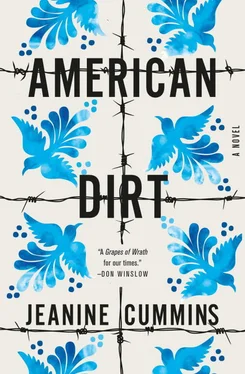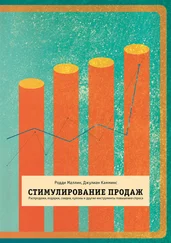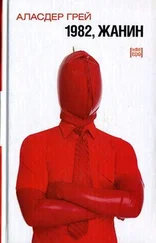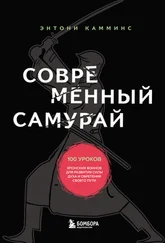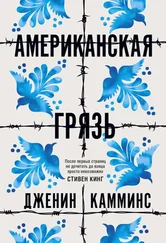Luca awakens from the nightmare with his heart pounding, but he’s not afraid. Or maybe it’s more accurate to say that he’s no more afraid than he always is now. His prevailing emotion is irritation, because Beto is sleeping beside him, farting. He lets another one rip while Luca lies there, blinking in the stench. It was such a nice dream until the odor turned it. ‘Papi,’ Luca says out loud in the dark. He rolls over and covers his nose with his sleeve.
They’re all awakened at dawn to the sound of a key in the lock and a crush of heavy bootsteps on the wooden stairs. El Chacal has arrived with five more migrants – two brothers from Veracruz named Choncho and Slim, plus their two teenage sons, David and Ricardín. The brothers are big, strong men, and even their teenage sons are big, strong men, and it’s impossible to tell which son belongs to which father because they all look so much alike. They have big voices and thick forearms and solid necks. They all wear jeans and plaid button-up shirts and enormous work boots. They have to duck their heads when they reach the bottom step. The four of them fill the apartment beyond its capacity. But there is a fifth man as well, named Nicolás, who’s tiny in comparison with the others, average-size. Like Marisol, he’s a deportado, and he has amazing blunt eyebrows, which look like they’re drawn onto his face with a marker, Luca thinks. He wears an Arizona Wildcats T-shirt and thick-framed glasses. He’s a lapsed PhD student at the University of Arizona.
El Chacal tells everyone to sleep today, to rest as much as they can, and to hydrate themselves. ‘Make sure you have the supplies you need. A warm jacket for the nights, and decent shoes for walking. No bright colors. Only things that will blend in with the desert, camouflage. If you don’t have the right gear, you don’t make the journey,’ he says. Lydia hadn’t thought of the colors. She does a quick inventory of their clothing in her mind. She thinks they’ll be okay. The coyote continues. ‘I’ll provide water. We leave before sundown.’
The apartment is stifling now, crowded with bodies and anticipation. In the bedroom, Lydia and Marisol are both on their knees, unpacking and repacking their belongings for the trip ahead.
‘I don’t know why I told my daughters to send all these clothes,’ Marisol says, rummaging through a small black suitcase. ‘I’m going to end up leaving all this behind. Now I’ll have to go shopping in San Diego.’
The woman seems to have forgotten Lydia’s odd behavior on the street, or at least she’s pretending to be untroubled by it.
‘I’m sorry for yesterday.’ Lydia wants to explain, but there’s so little she can say without revealing herself. ‘I got spooked. I’ve seen, we’ve seen so much atrocity, sometimes I can’t tell what’s real. Who to trust—’
‘Please,’ Marisol interrupts her. ‘Don’t apologize. You’re right to be wary, I’m sure.’
Lydia takes a deep breath. ‘If you want to stay alive, you have to be.’
Marisol stops rolling the T-shirt she’d been packing and looks up at Lydia. She nods.
Marisol makes the trip to the grocery store alone this time, and when she returns, she stores half in the fridge for later, and then she and Lydia prepare the food together, a huge amount of food, they think. There are eggs again, and rice and beans and tortillas, and this time also some plantains and more avocado, and even a small bit of cheese and some nuts and some yogurt, all of which are expensive but dense with the protein their bodies will require for the journey. The large brothers and their sons are happy with the food, and chivalrous about making sure everyone has enough to eat, but when it’s clear that the others are finished and there’s food left, they devour every morsel. Soledad and Beto do the cleaning up, while the others sit talking on the couches and stools.
Luca sits on the floor between his mother’s legs and listens to the grown-ups telling stories. Even though it’s a bunch of strangers in the house, it has the atmosphere of a party. As such, it makes Luca feel very still and alert. The large brothers from Veracruz are gregarious. They tell stories and sing songs, and their voices boom out through the room regardless of their intended volume. They are demonstrating for their sons how to be in the world, how to fill up even more space than the bulk of your body demands, to leave no room for misconceptions, to put people around you at ease with your unusual size. They tell stories of their years working in el norte, picking corn and cauliflower in Indiana, working as line packers at a dairy plant in Vermont, sending every paycheck home to Veracruz. Slim’s son Ricardín carries an armónica in his breast pocket, and when he takes it out to play it, his father slaps his leg in time with the song, which draws Beto out of the kitchen and into the center of the room, where he pushes aside the small coffee table to make room for break dancing. Rebeca flits away to the bedroom to rest, and the two quiet men who arrived first disappear as well, but the rest remain there, talking and sipping instant coffee from paper cups. Luca is drawn mostly to Ricardín, because of his quick smile and the armónica . Ricardín notices Luca watching him, and holds the armónica up.
‘Want to try?’ he asks.
Luca nods and stands up. He looks at Mami to make sure it’s okay first, and then, with her encouragement, takes a step toward Ricardín to study how he plays the thing, how he uses it to draw music out of thin air. Even seated on the couch, Ricardín is taller than Luca, so Luca has to look up into his face. When he holds the armónica up to his mouth, his hand is so large, the instrument disappears behind it, like he’s concealing it beneath a baseball mitt. His fingers move up and down, up and down, showing glimpses of the flat metal beneath. Luca watches carefully, and then Ricardín hands the armónica to him.
‘Go ahead,’ he says. ‘Give it a try.’
Luca takes it and holds it up to his mouth. He blows. And he’s surprised that, right away, he can make such a lovely sound.
‘Hey!’ Ricardín grins at him. Luca smiles and tries to hand it back, but Ricardín pushes it toward him again. ‘Keep going. Again!’
He claps his giant hands while Luca runs the metal instrument up and down his lips, trying the different sounds it makes. It’s easy.
‘ Chido, güey, ’ Beto says. ‘Can I try?’
Luca hands him the armónica. While the boys pass the instrument around, Choncho asks Marisol about her family in California. She tells them she was arrested at a routine immigration check-in almost three months ago.
‘Wait, you actually go to those things?’ Nicolás, the PhD student, asks.
‘Of course!’ Marisol says. ‘I play by the rules!’
‘What is it?’ This is Lydia.
‘A routine immigration check-in?’ Marisol asks.
‘Yes.’
‘It’s an appointment, usually once a year, where I have to go and check in with an ICE officer,’ Marisol explains. ‘So they can review my case.’
‘But what for? So you can get your papers?’
‘No, just so they can keep tabs on me,’ Marisol says.
Lydia is confused. ‘And ICE is…?’
‘Immigration and Customs Enforcement.’ Nicolás fills in the acronym. ‘I never went to a single one of my check-ins.’
‘I guess it doesn’t matter now,’ Marisol says. ‘We both ended up in the same boat. To think of all that wasted bus fare.’
‘But I don’t understand,’ Lydia says. ‘They always knew you were there?’
‘Sure, for years,’ Marisol says. ‘After my husband died, and I didn’t leave before the deadline they gave me, I received a notice to come for a check-in. I went every year. Never missed one.’
Читать дальше
